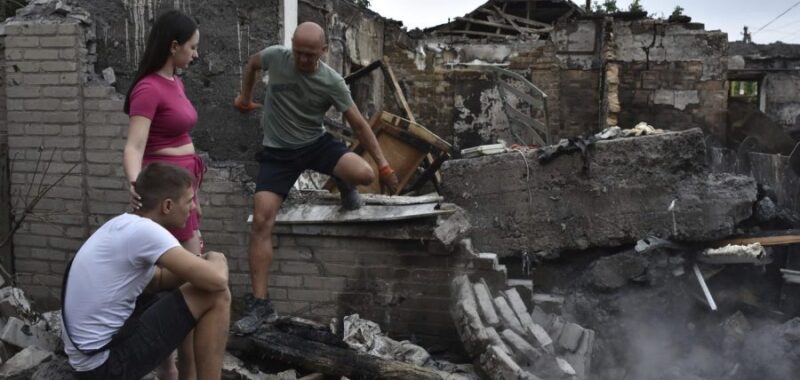
Sometimes it’s good to remind ourselves that Russia’s war against Ukraine is killing ordinary people.
Two recently posted letters from two courageous young women convey the extent of human suffering that Vladimir Putin has caused. They also put on display the resilience of the human spirit and thus the inevitability of Putin’s defeat.
The first letter is from the 35-year-old Oleksandra Mulkevych, a Ukrainian volunteer paramedic who was killed by a Russian drone on Aug. 14.
Here’s what Mulkevych wrote on Facebook just before her death (in my translation): “There is no greater happiness for a warrior than to die in battle. We are all a bit of a warrior, some are on the battlefield, some are fighting corruption, and some are restoring justice in the courts. … We are such a warlike nation. And we are very passionate about freedom. Ukrainians are free people, that cannot be taken away from us. Free in thoughts, views, and actions. And we have no limits. None whatsoever…
“I was lucky to be born in the best country in the world, Ukraine, and it is a country for which it is an honor to die. And it is even better to live for her … To educate young Ukrainians in love for the world and in strength and indomitability….Each of us carries a light inside, so don’t be afraid to light it. We will see each other again, there will always be Ukraine!”
Mulkevych’s patriotism and courage need no explanation. She may have been killed, but the spirit she embodies will always elude Putin’s grasp.
Small wonder that Russia’s president is incapable of winning the war and, instead, has opted for destroying civilian Ukrainians. Yet Mulkevych’s last line suggests that the genius in the Kremlin will fail at that as well.
The second letter is by a Russian — the 39-year-old theater director Zhenya Berkovich, who received a six-year prison sentence on July 8 for staging a play that supposedly promoted terrorism (an irony that only the kangaroo courts of Putin’s terrorist regime can fail to have seen).
Here’s what Berkovich wrote on Aug. 16: “I hereby inform you that I have temporarily (I hope) run out of optimism, joy, forgiveness and understanding, and so on….Okay, I admit: prison is hard, shitty and negative. The last time I was in the sun for more than 40 seconds was 15 months ago. Talking to my grandmother and children makes me want to howl and drown….There is absolutely no one and nothing to talk about in the cell, and the opportunity to be alone for at least an hour takes place once a week or two, if you sacrifice a walk. And yes, guys, during searches, when you enter and leave the pre-trial detention center, you have to squat. Without underwear….In short, there is nothing good, easy or positive in prison.
“But there are internal and external resources, with the presence of which it is quite possible — and in my case very necessary — to minimize your own suffering and torment, not to whine and not to feel like a victim….I haven’t smoked for almost three weeks already. And I’m on a diet. And I gave birth to a piece of the libretto for a new play. So I’m a good girl. And prison is a complete bummer….I love everyone. Well, okay, not everyone, but many!”
Berkovich is anything but exuberant about her imprisonment, but her spirit and sense of humor have clearly not been broken, even as she hints at the sexual abuse she must endure. As with Mulkevych, more evidence that Putin will fail.
There are many Mulkevyches in Ukraine. There are, alas, far too few Berkoviches in Russia. When the thousands who protested her imprisonment in an open letter become tens of thousands protesting the war on the streets of Moscow and St. Petersburg, Putin will be too busy running away to write a farewell letter.
That happy day is sure to come, thanks in no small measure to the ongoing Ukrainian offensive in Kursk Province. The war has now been brought home to Russia and its people in ways that were unimaginable just a few weeks ago. There is no more pretending that it is far away.
As reports of Russian casualties continue to pour in, Russian mothers and wives will at some point say that enough is enough. Like mothers and wives the world over, they will demand that Putin either go to the front or get lost.
Alexander J. Motyl is a professor of political science at Rutgers University-Newark. A specialist on Ukraine, Russia and the USSR, and on nationalism, revolutions, empires and theory, he is the author of 10 books of nonfiction, as well as “Imperial Ends: The Decay, Collapse, and Revival of Empires” and “Why Empires Reemerge: Imperial Collapse and Imperial Revival in Comparative Perspective.”

